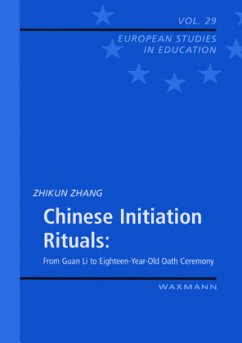As rites of passage, Chinese Initiation rituals such as Guan Li and Ji Li in ancient China and the eighteen-year-old oath ceremony in modern China are deeply rooted in Chinese history, society and culture. Such rituals have always played a very important role in Chinese society and family life, and today they seem to have been awakened from a deep sleep. In addition to other perspectives, historical anthropology can explore some hidden dimensions of these old and new rituals. Historical anthropology has a dual historicity: the historicity of the research object and the historicity of the research methods and perspectives. Through the dual historicity of this study we can analyze and understand Chinese initiation rituals historically and constructively. After discussion of some of the main theses in this research relating to body, gestures, mimesis, language and performance in the frame of historical anthropology, we can see not just the past and present performances of Chinese initiation rituals, but also foresee their future.
Bitte wählen Sie Ihr Anliegen aus.
Rechnungen
Retourenschein anfordern
Bestellstatus
Storno

